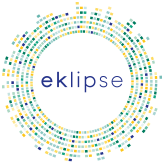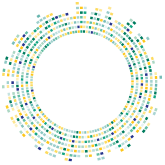One of our aims at Eklipse is to ensure that all its activities are carried out in an ethical manner. In addition to protecting integrity and credibility, this ethical framework is crucial for the cooperation of actors from different spheres (politics, academia, media, etc) within a complex science-policy-society interface.
Ethical framework
Our Ethical Infrastructure
We have implemented a structure that guides interaction among all actors within Eklipse, as well as with requesters or any external stakeholder. It encompasses three categories of measures and instruments. Eklipse Code of Ethics collects in a single document all the measures and instruments described below. This Code of Ethics will be complemented through lessons learnt and new needs that may appear (see the final draft of Eklipse Code of Ethics). All individuals who are invited to bring in their professional standing and expertise into the work of the Eklipse mechanism, are required to fill in a Declaration of Conflict of Interest (see Eklipse Declaration of Conflict of Interest).
Guidance
- Nine guiding values
- A code of ethics
- Training programmes
- A declaration of conflict of interest
Management
- A body for the management of the ethical infrastructure
- A complaint mechanism, including investigation and follow-up
- A transparent selection procedure for staff, requests, experts, reviewers and evaluators e.g. selection criteria, open calls for recruitment, etc. (see below)
Framework
- A set of measures to reinforce the ethical guidelines
- A legal framework including rules and directives
- A crisis management group
- Feedback processes, such as public consultations
- Transparency of all our outputs: broad dissemination, mandatory double-check of all accepted requests, follow-up of how reports are used, standard evaluation protocols

Our Guiding values
The guiding values that inform both the ethical infrastructure and formative evaluation of Eklipse are:
- To enable inclusivity with wide participation from all potential actors through open invitations for participation, building on participants’ enthusiasm and diversity
- To integrate perspectives from different geographical regions, disciplines and types of knowledge, including scientific, practitioner and traditional local knowledge
- To ensure quality and credibility by applying proven, tailored methodologies, developing systems for quality assurance (including the use of credible and consistent knowledge and extended peer-review), and diligently responding to feedback
- To minimise bias and ensure independence from external influence; and uphold fair, transparent processes by enforcing clear rules and procedures to avoid conflicts of interest.
- To integrate reflective learning by ensuring that processes and results are continuously and formatively evaluated
- To ensure legitimacy through fair and balanced science-policy processes and relevance of results to policy and societal needs
- To provide an innovative methodology and produce formats for knowledge and presentation of results
- To build relationships and trust between participants in science-policy dialogue and strengthen the network of involved actors and institutions
- And lastly, to ensure integrity by adhering to all of the named guiding values through all Eklipse processes and activities
Management of the ethical infrastructure
An important task of the Eklipse Management Body (EMB) is to ensure that all processes within Eklipse follows a code of ethics.
Eklipse has a series of guidance notes that describe the Eklipse bodies and the activities they conduct as part of Eklipse processes.
- Eklipse Guidance note 1: The Eklipse Management Body
- Eklipse Guidance note 2: the Knowledge Coordination Body
- Eklipse Guidance note 2a: Selecting the Knowledge Coordination Body
- Eklipse Guidance note 3: The Strategic Advisory Board
- Eklipse Guidance note 4: Preparing and managing calls for capacity building events
- Eklipse Guidance note 5: The Methods Expert Group
- Eklipse Guidance note 6: Expert Working Groups
- Eklipse Guidance note 6a: Guidelines for the Expert Working Group Outputs
- Eklipse Guidance note 7a: Selecting Requests
- Eklipse Guidance note 7b: Scoping with the Requester
- Eklipse Guidance note 7c: Preparing and Managing Calls for Experts
- Eklipse Guidance note 8: Preparing Reports
- Eklipse Guidance note 9: Crowdfunding
- Eklipse Guidance note 10: The Eklipse Alumni
- Eklipse Guidance note 11: Reflection and internal Evaluation



